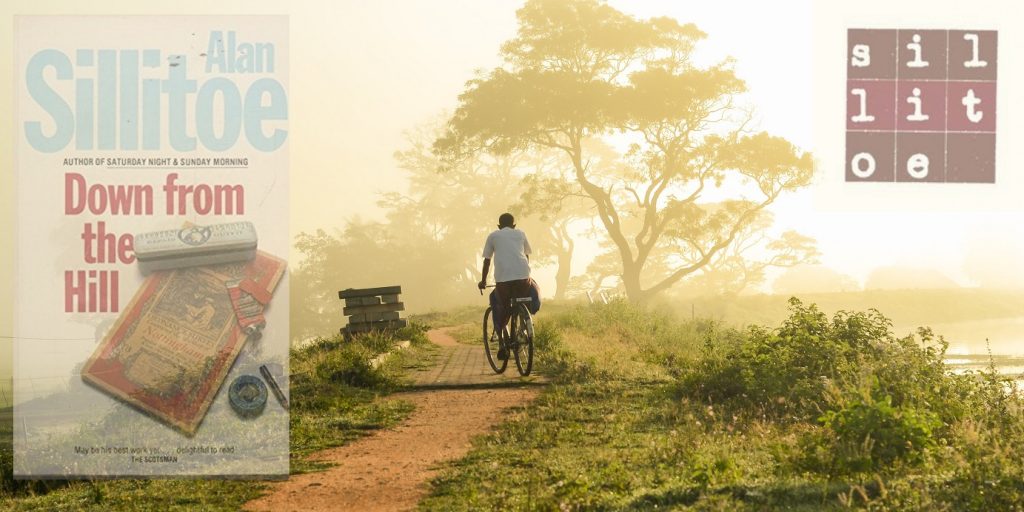
Photo by Amith Anuradha at Pexels. Design James Walker.
Down From The Hill (1984) starts off in 1946 and captures the sentiments of a generation for whom time was something to be filled rather than zipped through. It was a period when people would think nothing of cycling eighty miles across the country for a couple of hours company with a potential suitor. Reading this book it struck me how incomprehensible this must seem, now, when a GPS enabled smart phone can seek out immediate gratification within a one mile radius. It’s hard to deny the benefits of this latter option but the easiest route isn’t always the best. In the spirit of that other great Nottingham writer, D H Lawrence this book tends to favour the anticipation of the journey rather than the certainty offered by arrival.
The novel is classic Sillitoe with all the usual ingredients. There’s the violent imagery that accompanies any description of peace (‘I slept like a stone split in two by a sledgehammer’), the need to constantly embellish reality, such as imagining town names such as Ab Kettleby as real people (‘He had never done a good day’s labour in his life, and though I had worked from 14 I didn’t begrudge anybody their idleness.’), while the very next moment dismissing fanciful tales of ‘Jack Randall’ because there were quite a few Jack Randalls on his street. ‘Jack Randalls weren’t that rare where I came from.’ Sillitoe lets the balloon float for a few yards before snatching it firmly back to the ground. A Sillitoe reader must never take themselves too seriously.
His young adventurer dreams of sex with red-headed, freckled Alice Sands but instead settles for a momentary fling with a housewife who warns that her husband will be home soon. ‘I walked quietly out the gate. I wasn’t going to run.’ As always half of the fun is being caught, or perhaps Sillitoe’s characters are just so arrogant and stubborn they have no sense of consequence. But the most recurring theme is to take the good times when they come because it might be a while before they’re back again. In this, food is of equal importance as sex: ‘I enjoyed hunger because I had earned it, but also because at that moment it was more a part of me than anything else.’
Down From The Hill follows a six day cycle across Britain by a seventeen year-old. He returns in middle-age to repeat the journey in a car, but it is a futile process. The past is gone. Instead he marvels at the fact that he can cover in an hour what he’d previously only managed to do in a day on his bike. Technology is truly amazing but completing a journey quicker means that many experiences are lost on the way. The only thing to do is ‘keep on keeping on’.
Sillitoe loves the familiarity of his home but knows he has to leave ‘to know myself’ no matter what the guilt: ‘Each turn of the pedals needed more urgency than I had got. I pressed on & rode as if something was rotting in my mouth that was impossible to spit out.’
Now Alice Sands is no longer a six day journey away. She’s six seconds away courtesy of a webcam or a witty status update. There is no doubting the benefits of such instantaneous communication, but where does the sense of satisfaction come from when no effort is required?
I’ve tweeted the entire novel on TheSpaceLathe. I’ll tell you why when I take my next break.
